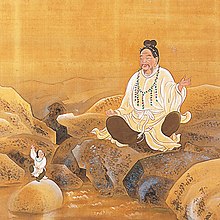Ōkuninushi
Ōkuninushi is a god in Japanese stories. He is worshipped in Shinto. He is important in Kojiki and Nihon Shoki, two old books about myths. Ōkuninushi is one of the most important gods, along with Amaterasu and Susanoo. He is more important in Izumo Shinto than Ise Shinto. Some stories say Susanoo is Ōkuninushi's ancestor and others say he is his father. In the stories, Ōkuninushi is in charge of the gods who protect the earth. He used to be the ruler of a place called Ashihara no Nakatsukuni. But when the gods in the sky asked him to give up his power, Ōkuninushi agreed and went to a hidden world. He was given that world to rule. Later, Amaterasu's grandson, Ninigi, came to Ashihara no Nakatsukuni to rule it. Ninigi became the first Japanese emperor's ancestor.
| Ōkuninushi-no-Kami | |
|---|---|
God of nation-building, agriculture, medicine, and protective magic
| |
 Ōkuninushi (right) and Sukunabikona (left)
| |
| Other names | Ōanamuchi / Ōanamuji / Ōnamuji-no-Kami (大穴牟遅神) Ōnamuchi-no-Kami (大己貴神) Ōnamuchi-no-Mikoto (大己貴命, 大汝命) Ōanamochi-no-Mikoto (大穴持命) Ōnamochi-no-Kami (大名持神) Kunitsukuri Ōnamuchi-no-Mikoto (国作大己貴命) Ame-no-Shita-Tsukurashishi-Ōkami (所造天下大神) Ashihara-no-Shikoo (葦原色許男, 葦原醜男) Yachihoko-no-Kami (八千矛神, 八千戈神) Ōmononushi-no-Kami (大物主神) Ōkunitama-no-Kami (大国玉神) Utsushikunitama-no-Kami (宇都志国玉神, 顕国玉神) Kakuriyo-no-Ōkami (幽世大神) Daikoku-sama (大黒様, だいこくさま) |
| Japanese | 大国主神 |
| Major cult center | Izumo Taisha, Ōmiwa Shrine and others |
| Color | Black |
| Texts | Kojiki, Nihon Shoki, Izumo Fudoki and others |
| Personal information | |
| Parents | Ame-no-Fuyukinu and Sashikuniwakahime (Kojiki) Susanoo-no-Mikoto and Kushinadahime (Nihon Shoki) |
| Siblings | Unnamed eighty brothers |
| Consort | Yagamihime, Suseribime, Nunakawahime, Takiribime, Kamuyatatehime, Torimimi (Totori), and others |
| Children | Kinomata (Kimata), Shitateruhime, Ajisukitakahikone, Kotoshironushi, Takeminakata and others |
Ōkuninushi is associated with the province of Izumo. This region may have been taken over by the Yamato court, and his surrender to the gods of heaven in myth might reflect this. The Fudoki, a gazetteer report of Izumo province from the early 7th century, contains many myths about Ōkuninushi and related deities. He is also featured in the Fudoki of other provinces like Harima. Ōkuninushi is known for having many romantic affairs with goddesses, resulting in the birth of many divine offspring, including the gods Kotoshironushi and Takeminakata.
Ōkuninushi is worshiped in many Shinto shrines across Japan, but the most famous one is the Grand Shrine of Izumo in Shimane. The Izumo Taishakyō group, which is based in this shrine, considers him their central deity. Ōkuninushi was also combined with the Buddhist deity Daikokuten before the Meiji period, when Buddhism and Shinto were blended.
Related pages
changeReferences
changeBibliography
change- Aoki, Michiko Y., tr. (1997). Records of Wind and Earth: A Translation of Fudoki, with Introduction and Commentaries. Association for Asian Studies, Inc. ISBN 978-0924304323ISBN 978-0924304323.
- Aston, William George, tr. (1896). Nihongi: Chronicles of Japan from the Earliest Times to A.D. 697. London: Kegan Paul, Trench, Trübner & Co.
{{cite book}}: CS1 maint: multiple names: authors list (link) - Chamberlain, Basil, tr. (1882). A Translation of the "Ko-Ji-Ki," or "Records of Ancient Matters". Yokohama: Lane, Crawford & Co.
{{cite book}}: CS1 maint: multiple names: authors list (link) - Kuroita, Katsumi (1943). Kundoku Nihon Shoki, vol. 1 (訓読日本書紀 上巻). Iwanami Shoten.
- Philippi, Donald L., tr. (2015). Kojiki. Princeton University Press. ISBN 978-1400878000ISBN 978-1400878000.
- Takeda, Yūkichi, ed. (1956). "Kōchū Kojiki (校註 古事記)". 青空文庫 Aozora Bunko. Retrieved 2020-05-16.
Other websites
change- Official website of Izumo Ōyashiro (Izumo Taisha) (in Japanese)